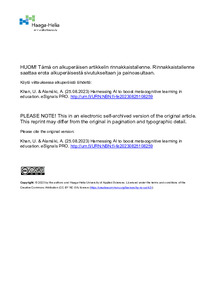Harnessing AI to boost metacognitive learning in education
Khan, Umair Ali; Alamäki, Ari (2023)
Lataukset:
Khan, Umair Ali
Alamäki, Ari
Haaga-Helia ammattikorkeakoulu
2023
Julkaisun pysyvä osoite on
https://urn.fi/URN:NBN:fi-fe20230912123531
https://urn.fi/URN:NBN:fi-fe20230912123531
Tiivistelmä
Metacognition, a term first introduced by Flavell (Flavell 1976), refers to the self-awareness of one’s thinking and learning patterns. Think of it as learning how to learn. It is not just about acquiring information but understanding how we process and retain that information. For instance, when preparing for an exam, some students might find that they recall material better when they teach it to someone else, while others might benefit from visual aids or mnemonic devices. Recognizing and acting on these personal insights is the essence of metacognition. It encompasses activities like planning how to approach a particular task, monitoring one’s comprehension, and evaluating the effectiveness of strategies used. For example, if you are reading a complex article and realize you have not understood the last few paragraphs, metacognition would involve recognizing this lapse and re-reading the section or seeking external resources to clarify the concept.
